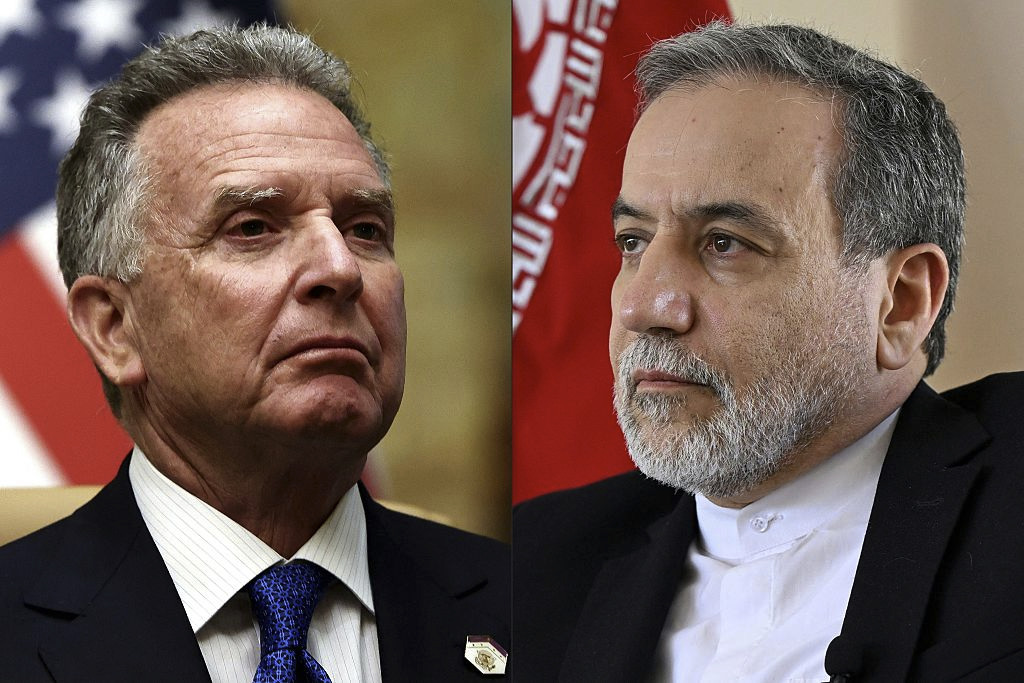
Will they, won't they?
This is the question that those interested in current talks between Tehran and Washington on Iran's nuclear program are darting around in the hope of getting a straight answer.
Public statements from both sides offer no clear answer.
President Donald Trump seems confident that an accord that reflects his wishes is well on the way to conclusion. He is even musing about a golden age of prosperity that awaits Iranians once the accord is signed.
Confident that his new diplomacy, let's call it diplo-business, will deliver what eight US presidents, including Trump in his first term, failed to do.
"They [the Iranians] are negotiating intelligently," Trump says.
You might say: we've been there, done that and bought the T-shirt! And you won't be wrong.
In 2016, then US Secretary of State John Kerry and Iranian Foreign Minister Mohammad Javad Zarif were awarded the prestigious Chatham House prize for their roles in negotiating "the historic Iranian nuclear accord" signed between six world powers and Iran.
The London-based think-tank claimed that the agreement "ended sanctions on Iran in return for curtailing its controversial nuclear program."
It praised the two men for their part in resolving "one of the most intractable diplomatic stand-offs in international affairs in the 21st century."
You might wonder why an intractable problem that was solved a decade ago has bounced back, begging to be solved again.
And you would be right.
The reason is that both sides practiced what the late French Prime Minister Jacques Chaban Delmas described as "fountain pen politics".
"Whenever I faced an intractable problem, I used my secret weapon: my Waterman fountain pen and signed the problem out of the way," he said in an interview.
In 2015, having been awarded the Nobel Peace Prize before even being elected, then President Barack Obama was desperate to do something to at least partly justify the unmerited award before he leaves the White House. The Iranian nuclear issue provided the opportunity needed.
Over a decade of claims that Tehran mullahs were building the bomb to trigger an Armageddon turned such an agreement into a holy grail in diplomatic circles.
For Obama, giving the final nod was even made easier because the "accord" that Chatham House described as historic was a "non-paper agreement" which meant no one needed to sign anything; waving the shadow of the fountain pen was enough.
The mullahs knew that the "agreement" drafted by Obama would have no impact on their ambitious plans to extend their theo-ideological empire as far as they could, and as long as they didn't hit something hard on the way. They also knew that Obama couldn't and wouldn't end sanctions imposed by the United Nations, the United States and the European Union.
But his nod and wink would be enough to let Tehran earn the $60 to $100 billion a year it needed to pay its billions, including the wages of its mercenaries across several Middle Eastern countries.
Let's return to the present situation.
I know that predicting the future should be left to fortune-tellers or Alvin Toffler and his "Third Wave" disciples.
So, risking ending up with egg on my face, I predict that the two sides will end up borrowing Chaban's fountain pen or its descendant and give Chatham House another occasion to grant one of it "prestigious" awards, this time perhaps to Iran's Foreign Minister Abbas Araghchi and US special envoy Steve Witkoff if he retains his side-chair at the Trump kitchen cabinet table.
The pen used won't be a golden one, like the one that Iranian Deputy Foreign Minister Kazem Gharibabadi quietly pocketed in Muscat last month.
Trump wouldn't get the Peace Prize because the Nobel coterie that grants it is regards him as public-enemy number one.
But why do l think the fountain pen is being filled with ink for another Chatham House "historic moment"?
The first reason is that Tehran has succeeded to reduce the whole issue to one of the degree of enrichment of uranium that Iran would be allowed to retain.
"Enriching uranium inside Iran is our red-line," says Araghchi. "Any suggestion that Iran be denied that right means an end of negotiation."
Supreme Guide Ayatollah Ali Khamenei goes further by implying that uranium enrichment is the only issue between Tehran and Washington.
"Whether Iran enriches uranium or not is none of your business," he said last Wednesday, addressing Trump. "Who do you think you are to make such a demand?"
Other mullahs have been whistling the same tune.
This is the scenario that the "Supreme Guide" is building around his jujitsu: We persuade everyone, especially the Iranian people, that the Great Satan is trying to entirely shut down our uranium enrichment. But we are resisting hard and in the end shall force the Great Satan to recognize our right to enrich uranium may be not to our heart's content, but at least to 3 or 4 percent.
Thus, we could declare another "historic victory" against the Great Satan go add to "other recent victories" that the "Supreme Guide" says Iran has scored in Lebanon, Syria, Iraq, Gaza and Yemen.
As long as Trump doesn't cite real issues, such as Iran's centrifuges, exporting revolution, promoting terrorism, seizing hostages, funding what is left of terrorist groups across the world, sending drones to Russia and cut-price oil to China, the mullahs will play the game around enriching the uranium they don't need.
Amir Taheri was the executive editor-in-chief of the daily Kayhan in Iran from 1972 to 1979. He has worked at or written for innumerable publications, published eleven books, and has been a columnist for Asharq Al-Awsat since 1987.
Gatestone Institute would like to thank the author for his kind permission to reprint this article in slightly different form from Asharq Al-Awsat. He graciously serves as Chairman of Gatestone Europe.


